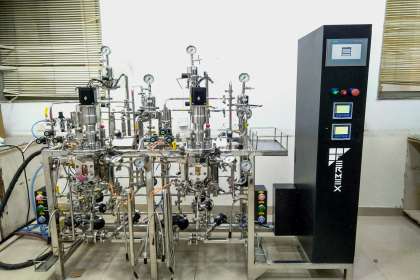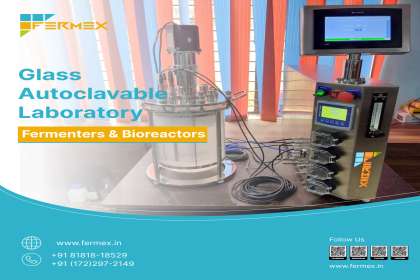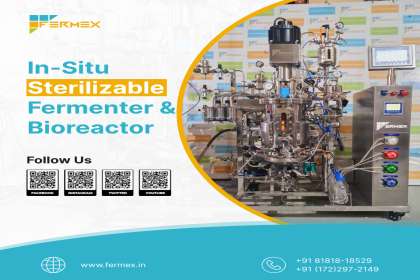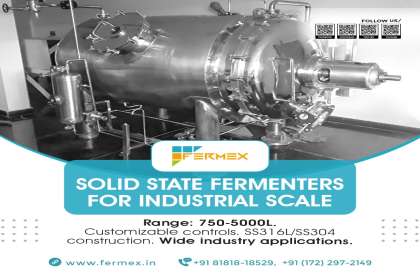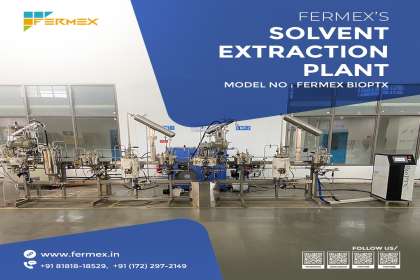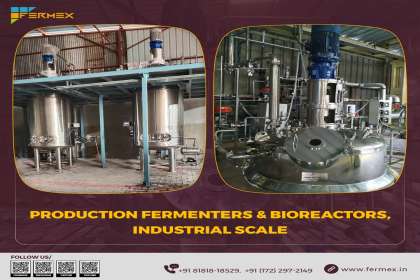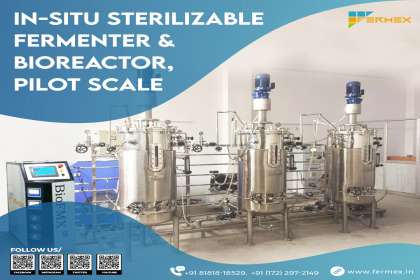Fermenters and Bioreactors in Transforming Biochemical Production for a Sustainable Future

Use of Fermenter in Production of Biochemical: –
Fermenters play a crucial role in the production of biochemical through a process called fermentation. Fermentation is a metabolic process in which microorganisms, such as bacteria, yeast, or fungi, convert organic compounds into useful products under controlled conditions.
- Fermenters supply nutrients, control pH and temperature, provide oxygen or create anaerobic conditions, and ensure proper mixing through agitation.
- Fermenters provide the ideal environment for microorganisms to carry out fermentation and maximize the production of biochemical.
Key stages involved in process of making Biochemical using Fermenters
The process of making biochemical using fermenters involves several key stages. While the specific steps may vary depending on the product being produced, here are the general stages involved:
1. Microorganism Selection: The first stage involves selecting and obtaining a suitable microorganism or cell line that possesses the desired characteristics for biochemical production. This can involve screening different strains or genetically modifying organisms to enhance their productivity.
2. Inoculum Preparation: In this stage, a small culture of the selected microorganism is prepared in a separate vessel known as a seed fermenter. The seed culture serves as a starter culture and provides a high-density population of the desired microorganisms for inoculation into the main fermenter.
3. Fermentation Setup: The main fermenter is prepared by sterilizing the vessel and the growth medium to ensure a sterile environment. The growth medium contains nutrients necessary for the microorganisms’ growth and production of the target biochemical. It may include carbon sources, nitrogen sources, minerals, vitamins, and other additives specific to the microorganism’s requirements.
4. Inoculation: Once the main fermenter is ready, the inoculum from the seed fermenter is transferred aseptically into the main fermenter. This step introduces the desired microorganisms into the growth medium, initiating the fermentation process.
5. Fermentation Process: The fermentation process occurs within the main fermenter, where the microorganisms grow and produce the target biochemical. The fermenter’s parameters, such as temperature, pH, dissolved oxygen, agitation, and nutrient supply, are carefully controlled and monitored throughout the fermentation process. These conditions are optimized to maximize the microorganism’s growth rate and biochemical production.
6. Harvesting: Once the fermentation process is complete, the culture broth containing the target biochemical and the microorganisms is harvested from the fermenter. Harvesting methods may involve separating the cells or microorganisms from the culture broth using filtration, centrifugation, or other separation techniques.
7. Downstream Processing: After harvesting, the target biochemical needs to be purified from the culture broth to obtain a final product of high quality and purity. Downstream processing steps may include filtration, chromatography, crystallization, distillation, or other separation and purification techniques, depending on the specific biochemical.
8. Formulation and Packaging: Once the target biochemical is purified, it may undergo further processing steps to formulate it into the desired final product. This can involve blending with other ingredients, formulation adjustments, and packaging in appropriate containers or formats.
9. Quality Control and Analysis: Throughout the entire process, quality control and analysis are conducted at various stages to ensure that the biochemical meets the required specifications and standards. This may involve testing for purity, potency, stability, and other quality attributes.
10. Storage and Distribution: The final product is then stored under suitable conditions to maintain its stability and integrity. It is packaged and distributed to end-users or customers for various applications, depending on the specific biochemical intended use.


Fermex Solutions LLP manufactures fermenters that can be used for these productions.
- Photobioreactors (Lab Scale)
- Tangential Flow Filtration
- Glass Autoclavable Fermenter (Lab scale)
- In situ Submerged Fermenter (Industrial scale)
- In situ Submerged Fermenter (Pilot scale)
Benefits of Fermenters in the Production of Biochemical
The use of fermenters in the production of biochemicals offers several benefits, which contribute to improved efficiency, scalability, and quality control. Here are some key benefits of using fermenters in biochemical production:
1. Enhanced Control: Fermenters provide precise control over various parameters such as temperature, pH, dissolved oxygen, agitation, and nutrient supply. This control allows optimization of the growth conditions for the microorganisms, leading to improved productivity and quality of the biochemical.
2. Scalability: Fermenters are designed to accommodate large volumes of culture, allowing for scalable production of biochemicals. This scalability enables manufacturers to meet market demand and increase production efficiency.
3. Consistent Quality: By maintaining optimal growth conditions and providing uniform mixing, fermenters contribute to the production of biochemicals with consistent quality. The controlled environment minimizes variations in product characteristics, ensuring reliable and reproducible outcomes.
4. Process Efficiency: Fermenters enable efficient utilization of resources by optimizing the growth conditions and providing a favourable environment for the microorganisms. This results in higher yields, reduced production time, and improved process efficiency.
5. Reduced Contamination Risks: Fermenters offer a sterile environment, minimizing the risks of contamination from unwanted microorganisms or contaminants. Strict sterilization protocols and aseptic techniques ensure the integrity and purity of the biochemicals being produced.
6. Automation and Monitoring: Modern fermenters are equipped with advanced monitoring and control systems, allowing for automation of various processes. Continuous monitoring of parameters and real-time adjustments ensure optimal conditions and enhance process control.
7. Versatility: Fermenters can be used for the production of a wide range of biochemicals, including enzymes, proteins, antibiotics, organic acids, biofuels, and more. The flexibility of fermenters makes them suitable for various applications across different industries.
8. Environmental Sustainability: The use of fermenters in biochemical production aligns with the principles of sustainability by promoting the utilization of renewable resources and reducing reliance on fossil fuels. Biochemicals produced through fermentation offer greener alternatives to traditional chemical processes.
9. Cost-Effectiveness: With efficient resource utilization, high productivity, and reduced contamination risks, fermenters contribute to cost-effective biochemical production. They help optimize production processes, lower operational costs, and improve overall profitability.
10. Research and Development: Fermenters play a crucial role in research and development activities related to biochemical production. They provide a controlled environment for studying and optimizing various parameters, facilitating process optimization and innovation in the field.









